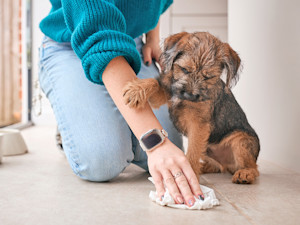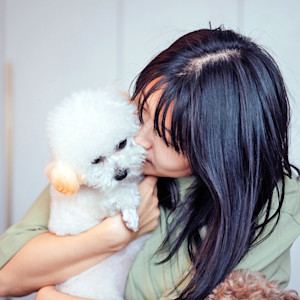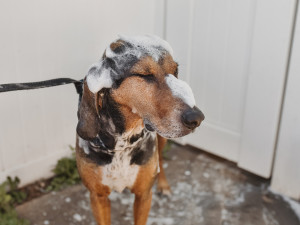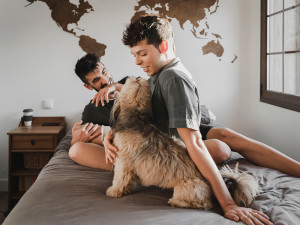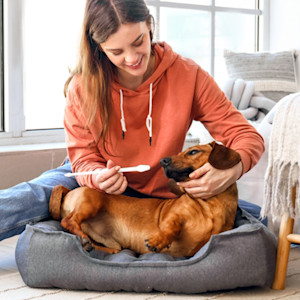6 Reasons Why Your Dog Might Still Stink Even After a Bath—and How to Fix That
If a bath won’t freshen them up, what will?
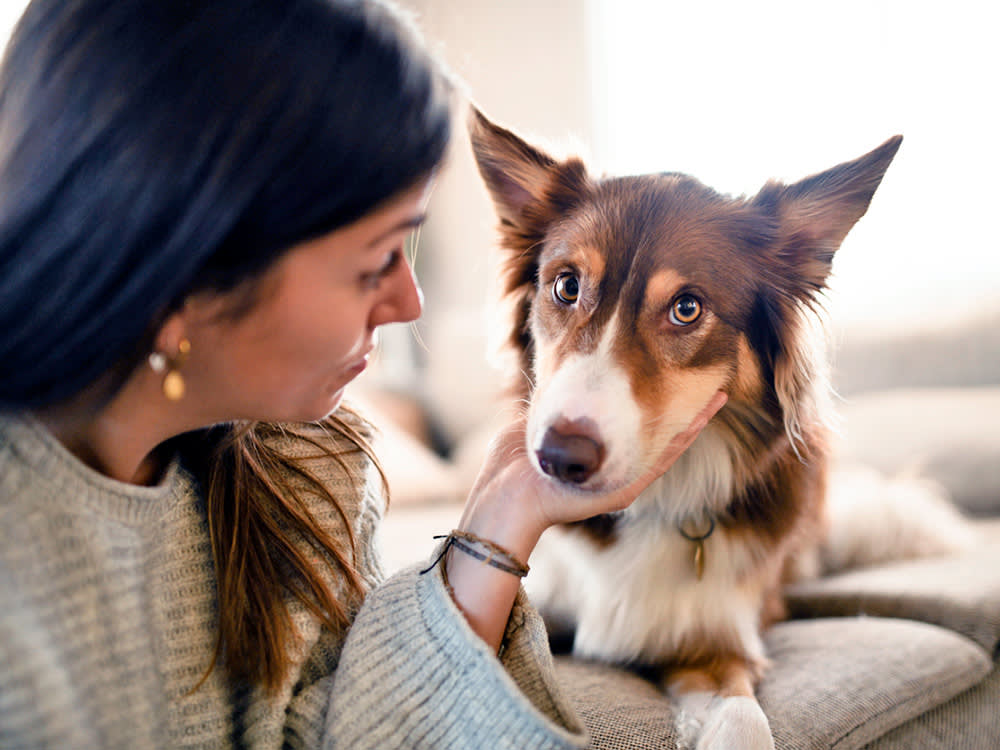
Share Article
In This Article:
Why Your Dog Still Smells After a Bath What to Do if Your Dog Still Stinks After Bathing How to Prevent Foul-Smelling Odors in Dogs When to Consult a Vet
If most of us could change one thing about our dogs, it would be their smell (well, when they stink, anyway). When they’re less than fresh, a bath will usually fix them. But there are times when even a bath fails to work its magic, and your dog still stinks.
There are a few reasons why a dog may smell even after a bath, and for most of them, you’ll want to have your pup checked out by a veterinarian. What are those reasons? Read on.
Main takeaways
Bathing often resolves normal dog odor due to dirty fur or skin.
Dogs with some health conditions, such as dental disease, anal sac problems, or skin issues may still stink even after a bath.
See your veterinarian if your dog has a persistent odor, especially if they’re showing other unusual signs.
The main reasons your dog may still smell after a bath
Most of the time, a good bath will remove the everyday dirt and oil buildup that can cause a dog to smell bad. But sometimes the odor is more serious than that. Let’s dig right in so that you can get to the root of your dog’s bad smell despite having a bath.

1. Periodontal disease
You probably rarely think about your dog’s teeth, that is until that ugly cloud of morning breath hits you in the face. Your rude awakening isn’t uncommon. In fact, it’s estimated that more than 80 percent of dogs over the age of threeopens in new tab have some form of dental disease, with periodontal disease being the most frequent.
Periodontal disease is when the tissues holding the teeth in place become inflamed or infected due to prolonged irritation from plaque and tartar buildup. This allows bacteria to run wild, spreading bad smells and weakening your dog’s hold on their teeth. If periodontal disease isn’t treated, it can lead to infections in other areas of the body as well as tooth loss.
2. Anal sac disease
Here’s another body part you likely don’t think about — or maybe even know your dog has — until it’s a problem. The anal sacs are tiny glands located just inside your dog’s rectum that produce and store a foul-smelling fluid that is released with each bowel movement. This scent is used as a communication marker to let other dogs know another dog has been in a location at a certain time.
That’s all fine until anal sacs become clogged or infected, often creating a fishy smell that doesn’t go away with a bath and sometimes causing a painful rear end. This can prompt your dog to scoot on the ground or constantly lick themselves.
3. Skin infections
A dog’s skin is an amazing tapestry of bacteria, fungi, and other organisms living in a delicate balance that, when healthy, provides protection and supports immune function, among other things. Little things — such as allergies, diet, or other health conditions — can throw off that balance, tipping the healthy skin scales towards an infection. When bacteria or fungus are allowed free rein, this can create an odor along with itchiness, a rash, or even oozy, open sores.
You may think that a bath will clear away the smell of skin issues, and it may for a while. Or it may make it worse. Either way, bad odors from skin issues typically require veterinary treatment to clear up the root cause.
4. Dog flatulence
Smelling a little dog gas is part of being a dog parent, but smelling a lot of dog gas can make even the most dedicated parent run for the other room. You see, gas production is a normal and healthy part of digestion. It’s just that sometimes, some dogs have more gas than others.
Dog gas that clears the room on a daily basis may be due to a dog’s diet, including the other things they may eat besides just their dog food. It can also be related to health conditionsopens in new tab like inflammatory bowel disease, pancreatitis, or even cancer.
5. Ear infections
If your floppy-eared dog is shaking their head so much you think they may scramble their brains, this could be because of an ear infection. The dark, warm setup of the ear canal is a great place for bacteria and fungi to breed, especially if you add a little moisture in there. Ear infections can create a smelly, brownish discharge, alongside some intense head shaking and ear scratching. They can also make the ear flap red and warm to the touch.
6. Skunk or other odorous substance on their fur
You may think that the worst part about your dog being sprayed by a skunk is the strength of the smell. But the worst part is actually how resilient the smell is, and how it barely budges with normal bathing. Skunk spray contains sulfuric compounds that are tough to remove with regular shampoo. It often requires a more powerful approach. The same goes for some other tough odors, such as urine or if your dog rolls in something dead. Ordinary baths may not cut these odors, so you’ll need to find a tougher enzymatic shampoo that will break down the smelly components.
What to do if your dog still stinks after bathing
If there’s a lingering odor after your dog’s bath, you’ll need to find the source. If your dog is willing, gently lift their lip and have a look at their teeth. Any brown discoloration or redness of the gums could indicate dental disease. Regular veterinary visits can help identify and treat dental disease before it becomes an overpowering, smelly issue.
You can also lift their ear flaps and check for any redness or discharge. However, ear infections tend to cause so much scratching that you’ll likely know something is up before there’s an unexplained odor. Have your veterinarian take a look if your dog’s ears are bothering them. Treating ear infections often requires a series of cleaning and applying medication. Some dogs may even need a change in diet.
If breath and ears aren’t the problem, look to the other end. You can’t see an anal sac or gas, but you may know there’s a problem if you look for other signs. Anal sac issues often cause scooting, licking, or straining to defecate. Gas may also cause lots of grumbling and rumbling noises in the abdomen, and even a tight stomach. See your veterinarian to help you figure out and treat these issues.
Finally, take a look at your dog’s skin. Redness, rashes, hair loss, and itching can all indicate skin issues that could be the cause of your dog’s smell. See your veterinarian if anything is amiss with your dog’s skin.
Other ways of bathing you can try, to treat more potent odors
The secret to getting rid of tough smells isn’t always more bathing. In fact, bathing your pup too often can cause some odors, because harsh shampoos can strip away the skin’s natural oils and lead to skin issues. Instead, you may need to change the shampoo you use. Gentle shampoos are always better, especially for bathing puppies. But for tough odors like skunk spray, you may need to look into an enzymatic shampooopens in new tab.
After bathing, make sure to really dry your dog. Pay special attention to cramped areas such as the ears, groin, armpits, and under the tail. If moisture is left on the skin, it can create a microbe holiday, potentially setting up your pup for skin and ear infections.
In between baths, use pet wipes to spot-clean your pup or try a leave-in shampoo.
How to prevent foul-smelling odors in dogs
The best way to keep your dog smelling nice is to make sure they are healthy. Healthy skin, ears, digestion, and teeth go a long way in making your dog smell good. Regular veterinary visits are a must to keep an eye on things and catch issues while they’re small and not quite so stinky.
At home, you can do your part by feeding them a high-quality diet and brushing your dog’s teeth regularly. Brush your dog’s coat a couple times a week, so you get a good look at their skin, and keep them on a leash when outdoors to prevent accidental run-ins with wildlife.
When to consult a vet
Let’s just say anytime something smells “off” with your dog is a good time to see your vet. New or lingering odors aren’t something you’ll want to turn your nose up at. Instead, brave the car ride with your stinky dog to make sure their bad odor isn’t something more serious than normal dog smell.
References
Kane, Ed PhD. “Flatulence in Dogs: Annoyance or Sign of GI Illness?” DVM 360. 1 Jan 2015. https://www.dvm360.com/view/flatulence-dogs-annoyance-or-sign-gi-illnessopens in new tab.
“Periodontal Disease.” Cornell Richard P. Riney Canine Health Center. https://www.vet.cornell.edu/departments-centers-and-institutes/riney-canine-health-center/canine-health-information/periodontal-diseaseopens in new tab.

Dr. Chyrle Bonk, DVM
Dr. Chyrle Bonk has been a mixed-animal veterinarian since 2010, with a special interest in rehabilitation. When she's not practicing or writing about veterinary medicine, you may find her exploring the outdoors with her family or tending to her cows, horses, chickens, or cats and dogs.
Related articles
![Dog washed after sprayed by skunk]()
What to Do When Your Pup Reeks of Skunk Spray
Learn how to get skunk smell off dogs — because plugging up your nose isn’t gonna cut it.
What Is the Best Way to Clean a Dog’s Teeth?
![Same sex couple with their dog lying on the bed laughing at his farts]()
Why Do Dogs Fart? Causes and Remedies for Dog Flatulence
Expert solutions for your pup’s unfortunate flatulence.
![Woman brushing her dog's teeth at home.]()
How Often Should You Brush Your Dog’s Teeth?
Some things you can do to keep those chompers sparkling through their senior years.
